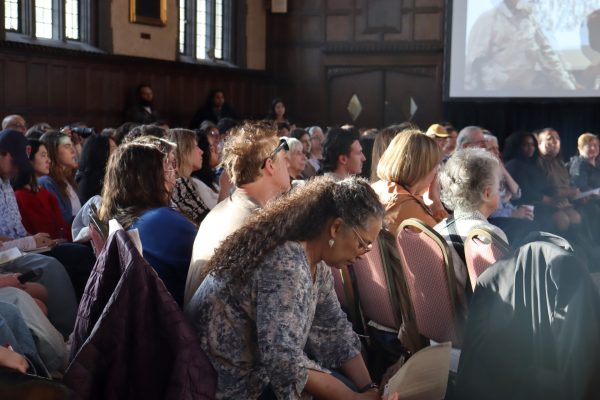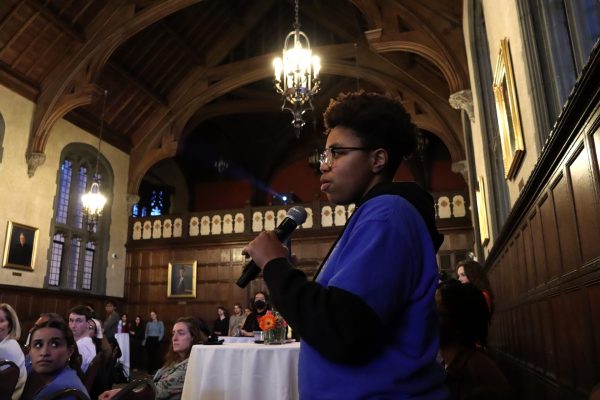In America, people charged with crimes are supposed to be innocent until proven guilty.
But those who have lived through America’s legal and correctional system say it’s not that simple.
“If you’re Black, brown or a person of color of any sort, you’re guilty. We’ve been programmed to think this way since they started black-and-white TV,” said Celia Colón, CEO and Founder of “GOD,” Giving Others Dreams.
Colón joined renowned anti-death penalty advocate Sister Helen Prejean at DePaul’s Cortelyou Commons Wednesday evening for a panel called “The Unimportance of Innocence.” They — along with DePaul law professor Jesse Cheng and restorative justice advocate Brian Beals — discussed the inner workings of race, gender and human dignity in the justice system.
Colón was incarcerated from the ages of 18 to 25. Since getting out of prison, she’s become an advocate for incarcerated people, especially incarcerated women, no matter their status of innocence or guilt.
She said in the American correctional system, “there’s never space for innocence.”
Prejean, Catholic nun and founder of Ministry Against the Death Penalty, describes herself as a witness to the semisecret process of legal executions in the United States.
“My mission is to tell the story and to help people be aware so that we can end the death penalty across this country,” she said to a crowd of DePaul students and faculty Wednesday.
Prejean has been ministering to people on death row for nearly half a century. Out of the many people she’s prayed with and advocated for on death row, Prejean said she has accompanied eight to their executions.
“Three of those eight have been innocent. It’s so broken,” she said.

Cheng, the DePaul law professor on the panel, explained that up to 90% of incarcerated people have never gone through a trial and instead opt for plea bargains.
“(America) is a system where 80% of all criminal defendants, when they’re charged with serious crimes, are represented by public defenders,” Cheng said.
When people cannot afford to hire legal representation, Cheng continued, they often take plea bargains for lesser prison time but “end up feeling like they have to plead regardless of whether or not they did it.”
Cheng repeated a quote from legal scholar Stephen Wright that he felt sums up the two-tracked American justice system:
“If you are wealthy, white and guilty, you will be treated better than if you are poor, Black and innocent,” Cheng said.
Prejean, 86, was raised in Jim Crow-era Louisiana. She said her advocacy work and her ministry have helped her understand the systemic racism in America that infiltrates how law enforcement operates and how justice is exercised.
DePaul law student Aurelia Flynn said she feels “so called” to work toward correcting systemic injustices as an attorney.
“The foundations of our country can never be separated from racism and segregation and the way that minorities are treated like second-class citizens,” Flynn said after the panel.
Flynn said racism and maltreatment in society and in the justice system are exacerbated when other identities such as class, age and gender come into play.
“People are treated worse based on the intersectionalities of their identities,” Flynn said.
While the percentage of Black Americans across the U.S. is 13%, the percentage of Black Americans in prison or jail is 37%, according to a report from the Prison Policy Initiative.
The same report shared that the percentage of people serving life, life without parole or “virtual life” sentences who are Black is 48%.
The Sentencing Project reported that the number of women in the carceral system increased by more than 585%, rising from a total of 26,326 in 1980 to 180,684 in 2022.
Colón, speaking from her experience behind bars and her work advocating for incarcerated women, said race, age and gender are key identities that compound the challenges of both imprisonment and reentry into society.
She said that women are treated most harshly in the correctional system, regardless of race or age.

“When women go in front of a judge, and usually it’s a man, there’s a lot of misogyny that still exists, and they’re looking at you like you’re a mom, you’re a woman. You shouldn’t be here right now,” Colón said.
She said women in prison are not safe due to physical violence and sexual harassment.
“And I can tell you that because I’m one of the many faces and survivors of prison rape, Colón said. “It is something that stays with you for life.”
Though the trauma of imprisonment is a defining factor in Colón’s life, she now takes pride in her work as a changemaker. Her organization “GOD,” Giving Others Dreams, works to lower the recidivism rate and help formerly incarcerated people achieve general education degrees.
The main objective of the panel was to spread awareness of these national injustices that often go unspoken.
“It doesn’t touch us, most of us,” Prejean said. “So it’s time to get the public to reflect deeply on these deep social issues and these issues of human rights — that’s kind of what my job is.”
Prejean doesn’t see her ministry as charity work. Rather, she views her ministry against the death penalty and her work to reform the carceral system as justice.
“The best definition of justice I got is, ‘It’s just us.’’’ Prejean said. “Then that call comes to us: What are you going to do?”
Related Stories:
Stay informed with The DePaulia’s top stories,
delivered to your inbox every Monday.
This post was originally published on this site be sure to check out more of their content.






